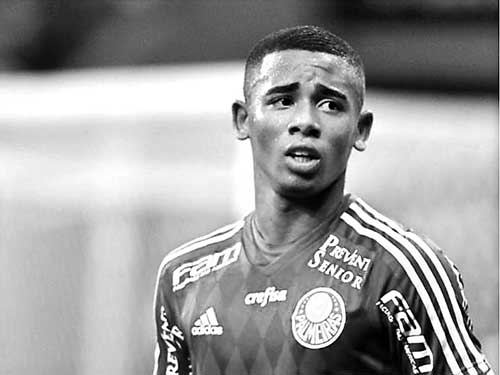Thursday Feb 19, 2026
Thursday Feb 19, 2026
Saturday, 31 December 2016 00:00 - - {{hitsCtrl.values.hits}}
AFP: Considered a saint by fans of Palmeiras and hailed by Brazilian superstar Ronaldo as his successor, teenage sensation Gabriel Jesus arrives at Manchester City with a skyrocketing reputation.
City manager Pep Guardiola sanctioned a £27 million ($33 million, 31.7 million euros) move for Jesus, 19, earlier this year, but allowed him to finish the Brazilian season with Sao Paulo club Palmeiras.
He went out with a bang, inspiring Palmeiras to a first league title in 22 years, winning Olympic gold with Brazil in Rio de Janeiro and scoring five goals in his first six international games.
None of it, however, has come as a surprise to Jose Francisco Mamede, coach at Jesus’s first club, the Pequeninos do Meio Ambiente de Sao Paulo.
“Gabriel came from a very poor neighbourhood and that’s why he’s not afraid,” says Mamede, 58.
“He will adapt to the food, to the cold in Manchester and everything else. In three years he’ll win the Ballon d’Or, because Messi will already be getting a bit old.” Guardiola, who dined with Jesus and his new Brazilian team-mates Fernando and Fernandinho in Manchester in December, has backed the youngster to make a major impact at the Etihad Stadium.
“When the ball is there, it’s a goal,” Guardiola said in August. “He has the sense of goal. So we buy goals.”
Jesus’s explosive emergence has brought to mind the prodigious feats of Neymar and Robinho, both of whom burst onto the scene as teenagers in Sao Paulo, albeit at rival club Santos.
His precocity was apparent from the beginning.
“From the very first training session, we saw he was different,” says Mamede, whose office is full of souvenirs of the young Jesus.
“He never lacked anything. He’d be the first to do the exercises. He was always determined to be a professional.”
The Pequeninos do Meio Ambiente de Sao Paulo play on the same pitch as a military prison and specialise in getting boys off the dangerous local streets.
From the age of 14, Jesus played in competitive local amateur tournaments, learning to compete against bigger opponents.
“At times, I would play as many as three or four games,” he recalled. “It was too much. There were times when I would get cramps.”
It was then that scouts from Palmeiras spotted the boy who they believed could become the club’s long-awaited saviour.
His road to trophies, multi-million-dollar contracts and snaking queues of autograph-hunters had begun.
The future star’s upbringing in the poor Jardim Peri neighbourhood of northern Sao Paulo could not have been more humble.
His mother, Dona Vera, raised him and three brothers alone, working multiple jobs.
She is proud of her son’s success, but says she felt compelled to ask for God’s forgiveness when she heard the Palmeiras fans singing: “Glory, glory hallelujah, it’s Gabriel Jesus!”
There is already a lot weighing on the youngster’s shoulders, as shown by the tears that flowed after he scored for Palmeiras against Atletico Mineiro in November.
Just two days earlier he had shone for Brazil against Peru, scoring one goal and setting up another, but he was suffering at his club because he had not scored in their previous eight games.
Now he faces the intense pressure of the English Premier League and must find a place in a City team that already boasts the attacking talents of Sergio Aguero, Raheem Sterling and Kevin De Bruyne.
If his career to date is anything to go by, he will take it in his stride.